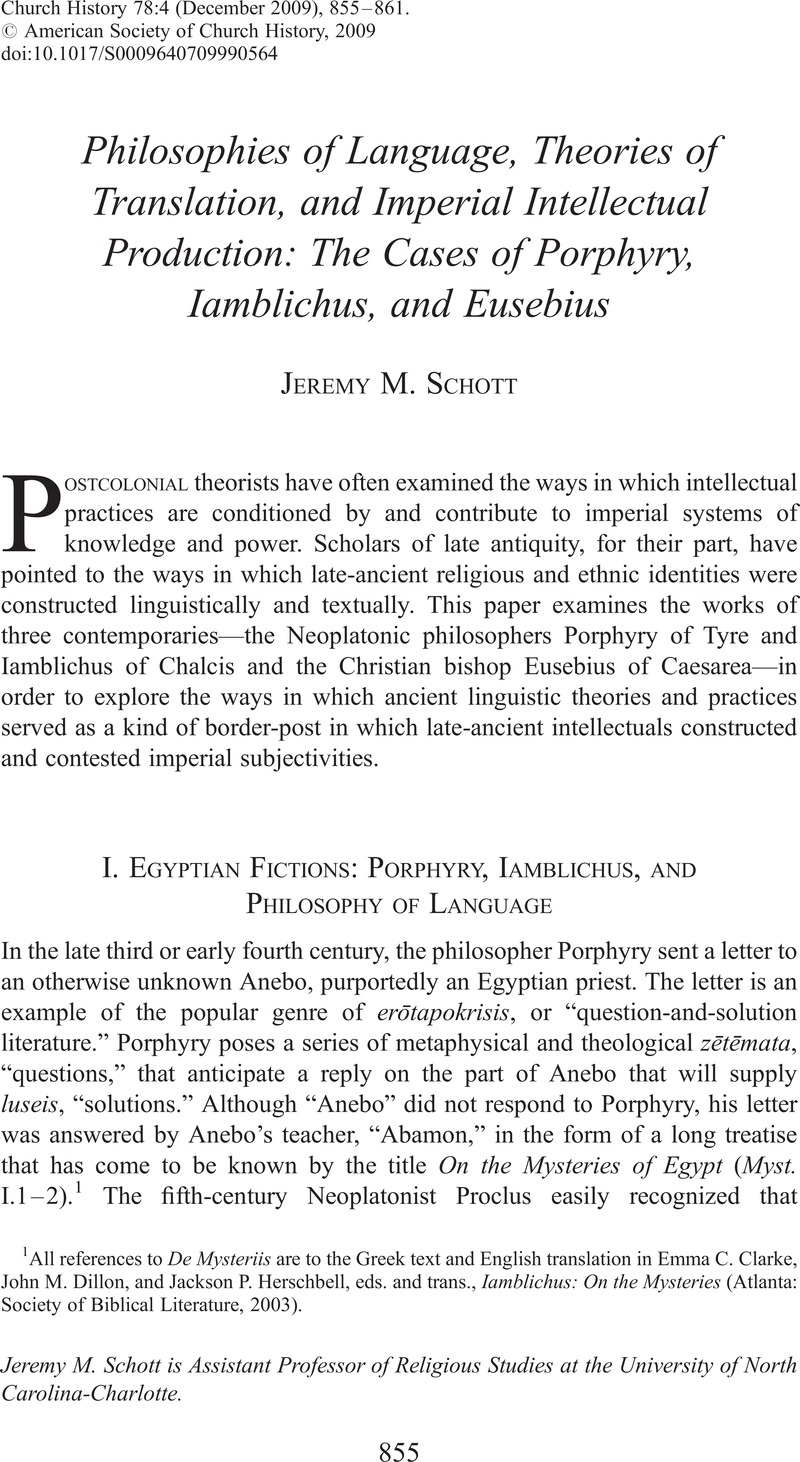No CrossRef data available.
Published online by Cambridge University Press: 27 November 2009

1 All references to De Mysteriis are to the Greek text and English translation in Clarke, Emma C., Dillon, John M., and Herschbell, Jackson P., eds. and trans., Iamblichus: On the Mysteries (Atlanta: Society of Biblical Literature, 2003)Google Scholar.
2 For an excellent discussion of the theurgic function of divine names in Iamblichus, see Shaw, Gregory, Theurgy and the Soul. The Neoplatonism of Iamblichus (University Park: Pennsylvania State University Press, 1995), 110–11, 179–88Google Scholar.
3 Aristotle De Int. 16a3–8.
4 See, for example, Plato Cratylus 431d; 439a.
5 Dodds, E. R., for example, considered theurgy symptomatic of a late-antique “age of anxiety” in Pagan and Christian in an Age of Anxiety (Cambridge: Cambridge University Press, 1965)CrossRefGoogle Scholar; Bury, J. B. remarked of Neoplatonism, “it is a fall or failure of something, a failure of nerve” quoted in Gilbert Murray, Four Stages of Greek Religion (Oxford: Oxford University Press, 1912), 7–8Google Scholar.
6 See, for example, Edwards, Mark, Culture and Philosophy in the Age of Plotinus (London: Duckworth, 2006), 117–19Google Scholar; Fowden, Garth, Empire to Commonwealth: Consequences of Monotheism in late antiquity (Princeton, N.J.: Princeton University Press, 1993), 38–40Google Scholar; O'Meara, John J., “Indian Wisdom and Porphyry's Search for a Universal Way,” in Neoplatonism and Indian Thought, ed. Harris, R. Baine (Norfolk, Va.: International Society for Neoplatonic Studies, 1982), 5–25Google Scholar. (Porphyry's interest in barbarian wisdom “may be an interest peculiar to Porphyry or of a developing or weakening Neoplatonism” [my emphasis, 22].)
7 Said, Edward W., Orientalism, rev. ed. (1978; repr., New York: Vintage, 1994), 133–34Google Scholar.
8 Here I adopt the concept of “homology” from Bourdieu, Pierre, The Field of Cultural Production, ed. Johnson, R. (New York: Columbia University Press, 1993)Google Scholar. Bourdieu describes cultural production as a field of social relations in which agents compete for symbolic capital and power. The field of cultural production is structurally homologous to other fields, all of which are homologous to the prevailing “field of power,” or dominant set of power relations in a society at a given moment in history (44–45). In the later Roman Empire, the field of power would be constituted by imperial relations of domination and subjugation; the homologous field of cultural production in which Porphyry and Iamblichus write is shot-through with the same relations of power. Bourdieu's concepts are also helpful because they account for the fact that “‘symbolic capital’ is to be understood as economic or political capital that is disavowed, misrecognized,” although it derives its ultimate value from the fact that its accumulation within the field provides material, economic, and political benefits within the larger field of power (75). Thus relating the philosophy of language to the politics of a larger field of imperial power does not reduce the practice of philosophy to the practice of empire; rather, it helps to set into relief aspects of cultural production (indeed some of the very ground of the possibility of that production) that often go unrecognized (or are denied) by the producers themselves.
9 Text: Mras, Karl, ed., Eusebius Werke Bd. 8: Die Praeparatio Evangelica. GCS 43.1, 43.2 (Berlin: Walter de Gruyter, 1954, 1956)Google Scholar.
10 On Eusebius's distinction between “Hebrews” and “Jews,” see Sirinelli, Jean, Les vues historiques d'Eusèbe de Césarée durant la period prénicéenne (Dakar: Université de Dakar, 1961), 147–63Google Scholar; Ulrich, Jörg, Euseb von Caesarea und die Juden: Studien zur Rolle der Juden in der Theologie des Eusebius von Caesarea (Berlin: Walter de Gruyter, 1999), 57–132CrossRefGoogle Scholar.
11 Schott, Jeremy M., Christianity, Empire, and the Making of Religion in Late Antiquity (Philadelphia: University of Pennsylvania Press, 2008), 153Google Scholar. See also Johnson, Aaron, “Identity, Descent, and Polemic: Ethnic Argumentation in Eusebius' Praeparatio Evangelica,” Journal of Early Christian Studies 12:1 (2004): 23–56CrossRefGoogle Scholar, and Jacobs, Andrew, Remains of the Jews. The Holy Land and Christian Empire in Late Antiquity (Stanford, Calif.: Stanford University Press, 2004), 29–32Google Scholar.
12 Evident throughout the De Myst., but some excellent examples occur in VII.1.249.10–11 (… boulomai tōn Aigyptiōn ton tropon tēs theologias diermēneusai; houtoi gar … [“… I would like to explain the mode of the theology of the Egyptians; for they …”] and X.7.293.1 (Auto de tagathon to men theion hēgountai … [“Good itself they consider …”]). At Myst. I.1.5–10, Iamblichus signals, in effect, the kaleidoscopic tendencies of his masquerade: “I am presenting myself to take up the discussion; and you, for your part, if you will, imagine that the same person in now replying to you as he to whom you wrote; or, if it seems better to you, posit that it is I who discourses with you in writing, or any other prophet of the Egyptians—for it makes no difference. Or better still, I think, dismiss from your mind the speaker, whether he be better or worse, and consider what is said, whether it be true or false, rousing up your intellect to the task with a will.”